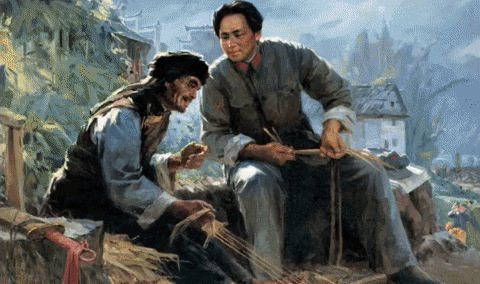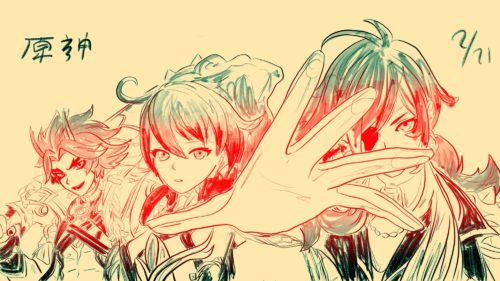Friday Song: 游击队之歌, a ‘red song’ that champions bipartisanship

When I was nine, my father went to China, returning to the country of his birth for the first time since he left as a teenager. It was 1975. Mao Zedong and Zhou Enlai were still alive, and the Gang of Four — one of whom, Yao Wenyuan, was actually a classmate of my father’s — was still in power. My father was taken on the then-obligatory Potemkin village tour: the people’s communes that had created prosperity for this New China, the simple folk art that embodied the contentment and perfect egalitarianism that society had achieved under the leadership of the Party.
By the time of his second and third visits to China, he’d shed any idealistic naivete about the Cultural Revolution, Mao, and the actual state of China. But when he first returned to the U.S. in 1975, he was still in the throes of earnest enthusiasm. He gave talks accompanied by his slides, and did screenings of Chinese “docuganda” films he’d managed to bring back, like The Tanzam Railway, while my mother sold Mao pins and Little Red Books at events sponsored by pro-mainland groups like the U.S.-China People’s Friendship Association. It didn’t embarrass me at the time, not nearly to the extent that the memory does now. It just bored me.
What really got through to me were the records. My father brought back albums on red-colored vinyl containing the greatest hits of the revolution — what Bo Xilai would later repopularize in Chongqing as “red songs.” I can still sing many of them now: “The East Is Red,” of course, but also “The Internationale,” and “Socialism Is Good,” and “Sailing the Seas Depends on the Helmsman” and many others.
My favorite by far, though, was “Guerrillas’ Song,” or 游击队之歌, by He Luting 贺绿汀 in 1937. It was rousing, spirited, and glorious — and the verses had an interesting, galloping rhythm that I hadn’t heard before in Chinese music. It had a huge hook.
And, as I later deduced, it was not actually a Communist song: There was no glorification of Mao, no insistence on the inerrancy of the Party, but actually lines like “不分穷,不分富” (whether poor, whether rich), evoking the days of the Second United Front. It was, instead, merely an anti-Japanese song — and was also sung, my parents informed me, in Taiwan after 1949.
The line about bipartisanship doesn’t seem to have survived the Cultural Revolution. In the accompanying video for this song, the first verses and chorus are repeated and the whole second half omitted, probably because of that particular lyric.
I’m responsible for having arranged and performed heavy metal versions of “The East Is Red” and “The Internationale,” and always wanted to do a version of “Guerrillas’ Song,” perhaps even in English. I’ve translated the lyrics below in a manner where they can be sung with the original rhythm of the Chinese melody. Give them a try!
我们都是神枪手
每一颗子弹消灭一个敌人
我们都是飞行军
哪怕那山高水又深
在密密的树林里
到处都安排同志们的宿营地
在高高的山岗上
有我们无数的好兄弟
没有吃,没有穿,
自有那敌人送上前
没有枪,没有炮
敌人给我们造
我们生长在这里
每一寸土地都是我们自己的
无论谁要抢占去
我们就和他拼到底
哪怕日本强盗凶
我们的弟兄打起来真英勇
哪怕敌人枪炮狠
找不到我们的踪和影
让敌人乱冲闯
我们的阵地建立在敌人侧后方
敌人的战线越延长
我们的队伍越扩张
不分穷,不分富
四万万同胞齐武装
不分党,不分派
大家都来抵抗
我们越打越坚强
日本强盗正在走向灭亡
待到最后胜利日
世界的和平见曙光
(I)
We are marksmen one and all
Each of our bullets ends another enemy
We’re an army on the wing
Mountains and rivers we don’t fear
In the deepest, darkest woods
Camps of our comrades set up nearly everywhere
On the highest mountain peaks
Legions of brothers beyond count!
There’s no food, there are no coats
These are provided by our foes
There’s no guns or cannons, true
The enemy makes those, too!
We were born and raised right here
Every last inch of land belongs to us alone
And to any would-be thief
We’ll bring him only death and grief
(II)
Facing bandits of Japan
Our brothers fight them ever so courageously
Facing gunfire from our foes
They’ll never find the slightest trace
Let the foe come charging in
Only to find us right behind the enemy
And the longer the enemy lines
The stronger our forces will become
Whether poor, whether rich
Four hundred million armed take up arms
Whether Red, whether White
All resist and fight!
Now our strength and power grow
Japanese bandits go to meet their maker now
When the day of victory comes
So comes the dawn of world peace
Friday Song is The China Project’s weekly sign-off — and what a week it was. Simone McCarthy reported on China’s sexual harassment problem. We launched a food show called The Secret Menu: The New Yorker‘s Jiayang Fan was our first chef. Read about the Santa Claus of Xinjian. And, don’t miss our handy guide to Chinese social media and our guide to the sources we trust most for China news and analysis.






